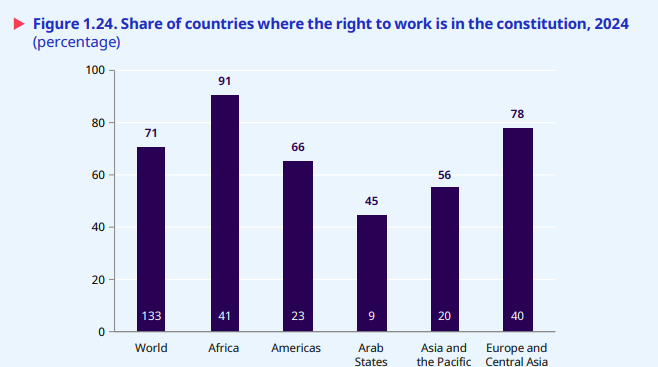State of Social Justice 2025

- 10 Oct 2025
In News:
The International Labour Organization (ILO) released its landmark report, “The State of Social Justice: A Work in Progress (2025)”, ahead of the Second World Summit for Social Development. The report marks three decades since the historic 1995 Copenhagen Summit and evaluates global efforts towards achieving justice, equality, and inclusion in a rapidly transforming world.
I. Purpose and Framework
The report assesses progress over 30 years in advancing social justice—defined as fair and equitable access to opportunities, rights, and resources—through four foundational pillars:
- Fundamental Human Rights and Capabilities – promoting freedom, equality, and universal social protection.
- Equal Access to Opportunities – removing barriers to education, employment, and fair wages.
- Fair Distribution – ensuring equitable sharing of the gains from economic growth.
- Fair Transitions – managing environmental, digital, and demographic shifts inclusively.
II. Global Progress: Achievements and Trends
1. Poverty and Labour Improvements
- Extreme Poverty fell sharply from 39% (1995) to 10% (2023).
- Working Poverty declined from 27.9% (2000) to 6.9% (2024).
- Labour Productivity per worker increased by 78% globally and by 215% in upper-middle-income countries, indicating narrowing productivity gaps between nations.
- Child Labour dropped from 20.6% (1995) to 7.8% (2024), driven by education access and monitoring systems.
2. Education and Skills
- Secondary school completion rates rose by 22 percentage points since 2000, underscoring significant human capital development.
3. Social Protection Expansion
- Over half of the global population is now covered by at least one form of social protection—pensions, healthcare, or income support—up from a marginal share in 1995.
III. Persistent Challenges
Despite these gains, the report warns that social justice remains “a work in progress,” with stark inequalities continuing to undermine inclusive growth.
1. Inequality and Wealth Concentration
- The top 1% of the global population controls 20% of income and 38% of total wealth.
- 800 million people still survive on less than US$3 per day, and one in four lacks access to safely managed drinking water.
2. Gender and Birth Inequalities
- Women earn 78% of men’s wages, and gender parity in labour participation has improved by only three percentage points since 1995.
- Nearly 71% of income outcomes globally are influenced by birth circumstances, reflecting entrenched structural inequities.
3. Informality and Job Quality
- 58% of workers remain in the informal economy, with limited access to labour rights and social protection.
- Collective bargaining rights have weakened globally, as reflected in declining compliance scores across income groups.
4. Declining Trust in Institutions
Confidence in governments, corporations, and unions has steadily eroded since the 1980s due to perceptions of unfair reward systems, corruption, and widening wealth gaps—posing risks to democratic stability.
IV. India in the Global Context
India mirrors many global patterns highlighted by the ILO but also shows unique progress in certain areas:
1. Poverty and Human Development
- Multidimensional poverty reduced from 29% (2013–14) to 11% (2022–23).
- Education: Secondary school completion rate reached 79% (2024), and female literacy stands at 77%.
- Digital Empowerment: The JAM trinity (Jan Dhan–Aadhaar–Mobile) enhanced direct benefit delivery and reduced leakages.
2. Social Protection and Welfare
Schemes such as PM-KISAN, Ayushman Bharat, and e-Shram have significantly extended coverage to over 55 crore unorganised workers. The Social Security Code (2020) further streamlined pension and maternity benefits.
3. Labour Market and Gender Gaps
- Informality remains high—over 80% of India’s workforce operates outside formal contracts.
- Female labour force participation has improved to 37% (PLFS 2024–25) but remains below the global average.
V. Managing Emerging Transitions
The ILO identifies three ongoing societal transitions that must be managed fairly to sustain progress:
- Climate Transition – Ensuring green jobs and protecting workers displaced by decarbonisation.
- Technological Transition – Bridging the digital divide through skills, reskilling, and inclusive access.
- Demographic Transition – Addressing challenges of ageing populations while leveraging youth dividends in developing countries.
To navigate these, the ILO recommends:
- Applying existing labour institutions to emerging contexts.
- Adapting them to specific transition challenges.
- Amplifying them by integrating labour concerns into climate, digital, and fiscal policies.
VI. ILO’s Key Recommendations
- Embed Social Justice Across Policies – Integrate equity into finance, trade, climate, and healthcare governance.
- Rebuild Trust in Institutions – Enhance transparency, accountability, and participatory policymaking.
- Invest in People – Expand education, skills, and lifelong learning to bridge gender and digital gaps.
- Strengthen Social Protection Systems – Aim for universal and portable coverage, backed by fair minimum wages.
- Promote Fair Transitions – Ensure environmental and technological shifts generate decent work.
- Enhance Global Cooperation – Reinforce multilateralism to manage migration, inequality, and global shocks.
